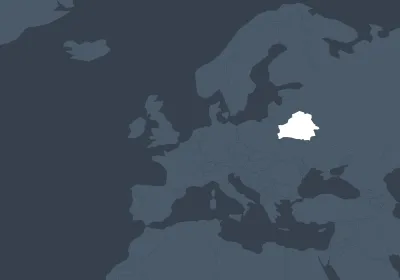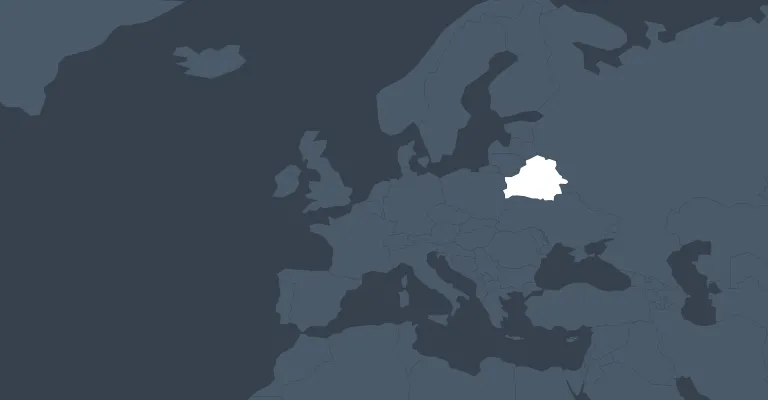
Belarus
| Digital Sphere | 7 32 |
| Electoral System and Political Participation | 1 32 |
| Human Rights | 4 36 |


On January 26, the Belarusian government will hold an openly rigged presidential election, the first presidential election since President Alyaksandr Lukashenka’s fraudulent reelection in 2020 that triggered mass protests across the country. Lukashenka, who is running for his seventh consecutive presidential term, will face four token candidates that have been screened by the Central Electoral Commission (CEC). With the entirety of the openly operating democratic political opposition either imprisoned or in exile, none of the candidates present any real challenge to Lukashenka. The judiciary and other institutions actively help advance Lukashenka’s agenda. Constitutional referendums in 1996, 2004, and, most recently, 2022, have further consolidated his control over government.
This assessment was last updated on December 12, 2024.
The Lukashenka regime’s brutal and continued crackdown in response to mass protests over his victory in the fraudulent 2020 election has effectively eliminated political opposition, independent media, and civil society in the country. Those who vocally opposed Lukashenka have either been imprisoned or have fled the country. The Viasna Human Rights Center, a Belarusian organization, reported that over 3,600 people have been held as political prisoners since 2020, with 1,296 in custody as of the end of November 2024. The vast majority of these political prisoners were arrested in the wake of the 2020 protests. An estimated 500,000 people have fled the country since 2020.
The 2025 presidential election follows parliamentary elections held in February 2024 that were widely considered rigged. The opposition, led by Sviatlana Tsikhanouskaya, called for a boycott of the vote, and the Belarusian regime did not invite the Organization for Security and Co-operation in Europe (OSCE) to observe the elections.
Belarus has a score of 12 out of 100, with 100 representing the strongest defenses against digital election interference. Freedom House’s Election Vulnerability Index is based on a selection of key electoral indicators. The score reflects widespread website blocking, arrests, and violence in retaliation for online activities.
Freedom House has identified the following as key digital interference issues to watch ahead of election day:
- Website blocks and content removal: Lukashenka’s regime ramped up website blocking and content removal after the 2020 protests. According to human rights organization Human Constanta, at least 12,000 websites were blocked by the end of 2023, including the sites of foreign news outlets virtually all non-governmental organizations and independent Belarusian news outlets. The government also routinely issues additional blocking orders against websites of news outlets operating in exile, which have registered new domains. The government also blocked several virtual private networks (VPNs) in May 2024, ahead of virtual elections for the exiled opposition’s Coordination Council in May 2024, which required a VPN for those inside Belarus.[ES1] Since 2020, the government has employed “antiextremism” legislation to force websites and social media users to remove “extremist” blogs, posts, and comments. While authorities are unlikely to introduce new mechanisms to facilitate website blocking or content removal ahead of the presidential election given the already narrow space for online dissent, they could employ existing measures to restrict access to content that criticizes them.
- Arrests and prosecution: Hundreds of political prisoners in Belarus have been imprisoned in retaliation for their online activity. Administrators of social media channels, especially on Telegram, that criticize the government have been handed multiyear sentences. For example, Yana Pinchuk, who reportedly managed several Telegram channels critical of the government, was sentenced to 12 years in prison in June 2023. Further, in November 2024, over 100 people were detained in a week for Telegram posts related to the election, according to the Viasna Human Rights Center. The Lukashenka regime can be expected to continue to arrest critical voices in the remaining period leading up to the election.
- Harassment and intimidation: Those who criticize the government online face routine physical attacks, including in custody. Torture is widespread in Belarusian prisons and four political prisoners jailed for online activities have died in custody. 6tv.by journalist Ales Sabaleuski was beaten during his December 2023 interrogation on trumped up “extremism” charges. Relatives of critics who have fled Belarus have also had their apartments raided by security forces or been sentenced to prison on bogus charges to intimidate those operating in exile. At the same time, government-affiliated social media channels have intensified their harassment and intimidation of critical voices. Security services, and social media channels affiliated with them, publish “repentant” or “confessional videos,” which can include incriminating information about people’s private lives. State media have also produced and distributed such videos.
- Information manipulation: With the majority of independent news outlets blocked, state-linked outlets dominate the online space, spewing pro-government propaganda. In July 2023, Lukashenka thanked state journalists for helping him hold onto power following the 2020 protests. Belarusian state outlets publish false information denigrating the European Union, sometimes in conjunction with Russian propaganda arms. Belarus’ information space has also been a target of the Kremlin’s propaganda narratives, though the interests of the two states have become significantly more aligned since 2020. State outlets and social media channels are expected to continue to promote false stories beneficial to Lukashenka and detrimental to his opponents ahead of the vote.
Belarus is rated Not Free in Freedom in the World 2024, with a score of 8 out of 100 with respect to its political rights and civil liberties; Not Free in Freedom on the Net 2024, with an internet freedom score of 22 out of 100; and as a Consolidated Authoritarian Regime in Nations in Transit 2024, with a score of 2 out of 100 for the country’s democratic progress. To learn more, please visit the Belarus country reports in Freedom in the World, Freedom on the Net, Nations in Transit, and Freedom House’s Belarus country portal.


Country Facts
-
Population
9,228,000 -
Global Freedom Score
7 100 not free -
Internet Freedom Score
20 100 not free -
Date of Election
January 26, 2025 -
Type of Election
Presidential -
Internet Penetration
89.50% -
Population
9.1 million -
Election Year
_2025-
